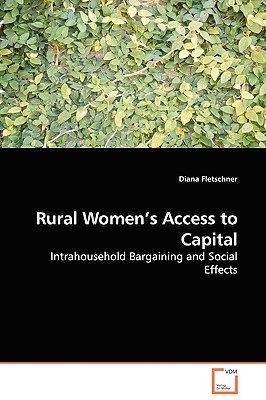
- We will send in 10–14 business days.
- Author: Diana Fletschner
- Publisher: VDM Verlag
- ISBN-10: 3639082826
- ISBN-13: 9783639082821
- Format: 15.2 x 22.9 x 1 cm, minkšti viršeliai
- Language: English
- SAVE -10% with code: EXTRA
Rural Women's Access to Capital - Intrahousehold Bargaining and Social Effects (e-book) (used book) | bookbook.eu
Reviews
Description
Empirical studies on credit rationing in rural markets have typically been silent on the way women's constraints differ from men's, implicitly suggesting that credit constraints are gender neutral or that any gender-based differences in access to credit can be smoothed within the family. These assumptions are not always valid. Compared to men, rural women in much of the developing world face legal and cultural restrictions that further limit their access to capital. While some may be able to overcome these constraints with their partners' assistance, spouses can have conflicting preferences and husbands may refuse to alleviate their wives' credit constraints despite having access to sufficient capital to do so. In addition to these supply-side constraints, social pressure may also limit women's engagement in entrepreneurial activities and their demand for capital even when they have profitable projects. Using data from Paraguay, the analysis in this volume explores these hypotheses theoretically and empirically and reveals a larger set of tools available to policymakers interested in improving gender equity, social welfare, or broad-based growth in rural communities.
EXTRA 10 % discount with code: EXTRA
The promotion ends in 21d.20:46:49
The discount code is valid when purchasing from 10 €. Discounts do not stack.
- Author: Diana Fletschner
- Publisher: VDM Verlag
- ISBN-10: 3639082826
- ISBN-13: 9783639082821
- Format: 15.2 x 22.9 x 1 cm, minkšti viršeliai
- Language: English English
Empirical studies on credit rationing in rural markets have typically been silent on the way women's constraints differ from men's, implicitly suggesting that credit constraints are gender neutral or that any gender-based differences in access to credit can be smoothed within the family. These assumptions are not always valid. Compared to men, rural women in much of the developing world face legal and cultural restrictions that further limit their access to capital. While some may be able to overcome these constraints with their partners' assistance, spouses can have conflicting preferences and husbands may refuse to alleviate their wives' credit constraints despite having access to sufficient capital to do so. In addition to these supply-side constraints, social pressure may also limit women's engagement in entrepreneurial activities and their demand for capital even when they have profitable projects. Using data from Paraguay, the analysis in this volume explores these hypotheses theoretically and empirically and reveals a larger set of tools available to policymakers interested in improving gender equity, social welfare, or broad-based growth in rural communities.


Reviews